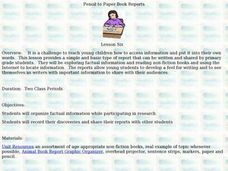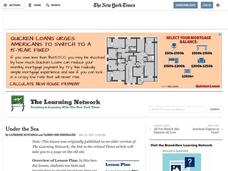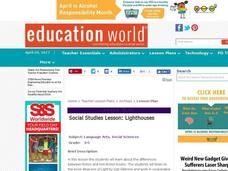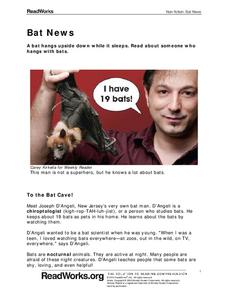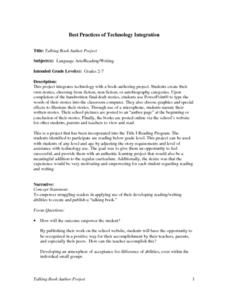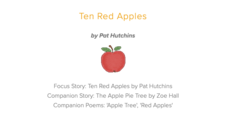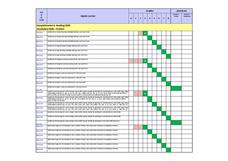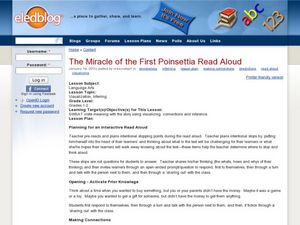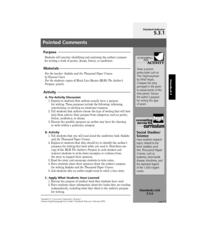Curated OER
Pencil to Paper Book Reports
Students explore the concept of how to write a factual book report. In this book report lesson plan, students conduct research on various topics. Students then use the information to write a book report in their own words.
Curated OER
Using Pictures to Support the Main Idea
Second graders practice using photos to support the main idea. In this reading comprehension instructional activity, 2nd graders read and explore the photos in the book, Amazing Tigers! Students examine the photos to identify and support...
Curated OER
A Christmas Carol Exploration
Seventh graders explore the history of Christmas by researching classic literature. For this holiday lesson, 7th graders read the story A Christmas Carol and discuss the tone of Charles Dickens' classic literary work. Students answer...
Curated OER
Lesson 2: Important Person
What kid wouldn't love to learn about George Washington? The class reads a simplistic biography about George Washington to find out why he is so famous. They chart the things he did, as well as what makes a non-fiction book a biography....
Curated OER
Under the Sea
Learners imagine and describe fictitious sea animals that might live in the ocean. After reading an article, they reflect on new discoveries found in the ocean recently. Using the internet, they research the interdependence of animals...
Curated OER
Different Genres In Literature
Third graders view different genres of literature and identify which genre is being presented to them. In this genres lesson plan, 3rd graders choose from fiction, non fiction, and a poem.
Curated OER
Understanding Core Values Using the Frayer Model
Students complete the Frayer Model. In this literature lesson plan, students review the concept of theme in literature. Students identify major themes in books they've read. Students learn the attributes of the Frayer Model and then...
Curated OER
"Lighthouses"
Students listen to the book "Beacons of Light" by Gail Gibbons and identify the different characteristics and facts concerning lighthouses and their history. They examine the differences between fiction and non-fiction books and engage...
Read Works
Bat News
Get the bat facts with a short nonfiction reading passage. After reading the passage, readers respond to questions that focus on main idea, inferencing, vocabulary in context, and author's purpose.
Curated OER
Talking Book Author Project
Learners explore fiction, non-fiction, and autobiographies. They create their own stories using one of the categories. Students create a PowerPoint presentation to tell their story.
Curated OER
Short and Sweet
Students explore how to summarize a text while reading. They discuss what it means to summarize. Students read a non-fiction text and practice summarizing the pages they read. They highlight the main ideas and important details within...
Curated OER
Analyzing Textbook Formats
Students explore the characteristics of a non-fiction text. In this comprehension lesson, students are led on a guided tour of each text and identify the features of a non-fiction text. Students continue to practice locating features...
Curated OER
Ten Red Apples; The Five Senses
A clever lesson designed around an apple awaits your learners. Descriptive words are used to explain what they believe is inside a bag while using their five senses. Students read the story The Apple Pie Tree and are introduced to the...
Curated OER
Immigration to the United States
Students discover the implications of immigration. In this immigration lesson plan, students read fiction based on immigration experiences as well as non-fiction on the topic. Students write and share book reviews of the literature they...
Curated OER
Just the Facts, Ma'am
Students use tables of content, chapter titles, and key words as a strategy for organizing non-fiction information. They write a paragraph with a partner using information from a graphic organizer.
Curated OER
The Beautiful Moon: Story and Comprehension
In this beautiful moon: story and comprehension activity, 3rd graders read a one passage about moon facts, then answer 5 multiple choice questions, with answer key provided.
New York State Education Department
TASC Transition Curriculum: Workshop 5
Are video games sports? Pupils investigate this question as well as various nonfiction selections to learn more about claims and the support that defines them. All of the selections mimic the rigor on state tests and encourage close...
Sunburst Visual Media
Respect: It Starts With You!
There are few things as frustrating to a teacher as a disrespectful student. Luckily this collection of activities, worksheets, and writing exercises is here to help eliminate this problem by teaching young leaners what respect really...
Consortium for Ocean Science Exploration and Engagement (COSEE)
Understanding the Food Web
Building on prior knowledge of the pervious lesson in the series, pupils explain the previous lesson to each other. Then they write a simple guide for a young child to read on the same topic.
Curated OER
Summarizing Key Information
Students summarize information. In this language arts lesson, students summarize information from a fictional text. Students read a folktale and summarize the story.
Curated OER
The Miracle of the First Poinsettia
Connecting to literature and learning how to infer are two great reading strategies everyone needs to know. Here, the class will read along with the story The Miracle of the First Poinsettia, review folktales as a genre, and make...
Curated OER
Reading a Newspaper
Students define the terms associated with parts of a newspaper. They identify various sections of a newspaper and the type of articles found in each and provide the responses to who? what? when? where? and why? contained in a ...
Curated OER
Go For The Gold!
Third graders read fiction and nonfiction works for comprehension. Using the internet, 3rd graders participate in a WebQuest. They compare and contrast the Olympics in ancient Greece to the modern day Olympics. Afterwards, students...
Curated OER
Pointed Comments
Fifth graders analyze pieces of writing to identify the author's purpose of writing. In this writing lesson plan, 5th graders consider a variety of pieces of writing such as, poetry, drama, fiction, and non-fiction. Each student...
Other popular searches
- Non Fiction Reading Passages
- Non Fiction Reading
- Non Fiction Reading
- Active Reading Non Fiction
- Shared Reading Non Fiction
- Reading Non Fiction Text
- Non Fiction Reading Pre Test
- Non Fiction Reading Skills
- Non Fiction Reading Journal
- Non Fiction Reading Logs
- Lesson Non Fiction Reading
- Non Fiction Reading Lessons


